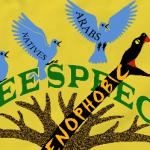Last month, Slate featured an interview with Dekila Chungyalpa, the founder and director of the World Wildlife Fund’s Sacred Earth program. In it, Chungyalpa explains how religious leaders can use their influence to encourage their communities to be better stewards of the environment. This may seem like an odd bailiwick for religion, but belief can have a strong impact on a community. This gives religious leaders a great deal of responsibility, both toward their congregations, and toward those beings and places that may be affected by the people.
Some of this is achieved through communication with the community. Religious leaders in Africa stood together against the poaching of critically endangered wildlife. Not only did these individual people choose to make this stand, but they took these ideas back to their congregations and communities. Beyond Africa, Chungyalpa stated that the WWF has been partnering with religious leaders in parts of Asia where the demand for rhino horn and other black market animal parts for medicine is high. Not only has this involved promoting the protection of wildlife in and of themselves, but also educating people about why these folk remedies are ineffective, and how to get medicines that actually work.
Modeling is another effective tactic. Himalayan Buddhist monasteries have been creating organic gardens, adopting solar power, and actively educating their communities. There and in India monks have planted trees and cleaned up rivers, and in Nepal they’ve created recycling programs. Again, people who look up to these monks for inspiration see what they do, and may be inspired to adopt these greener practices themselves.
But it’s not just in Africa and Asia where religious leaders can have an impact for the better. Christianity, the dominant religion in much of the Western world, is often associated with Genesis 1:26, where it is said that humanity shall have dominion over the Earth, an attitude that has often been used as an excuse to pollute and destroy with impunity. Add to that the idea that this world is flawed, and that more care should be taken in preparing for the next one, and you have a tradition of environmental degradation excused by religion. But that’s just part of the story. For one thing, industry and the linear concept of “progress” have been even more instrumental in environmental destruction than Christian doctrine, so we can’t just pin it all on the Church and go from there.
For another thing, holy writ is constantly being reinterpreted. Think the Bible is just a tool for “dominion”? There’s The Green Bible, a companion to the Bible that helps readers look at the scripture in a more eco-friendly manner. Books specific to particular Christian denominations exist, too; Care For Creation explores a Catholic approach to environmentalism, as just one example. This follows a growing trend for individual congregations and even entire denominations to move toward more sustainable ideals. In 2006 the Presbyterian Church passed a resolution encouraging members to aspire toward carbon neutrality. Earlier, in 1989, the Episcopalian Church founded the Episcopal Ecological Network, which helps members to be more caring of God’s creation and demonstrate why this is an integral part of religious practice.
This all may seem like old news to many neopagans who consider themselves to be part of nature-based spiritual paths. In fact, if you’ll forgive the pun, for you regular readers of No Unsacred Place it very well may feel like I’m preaching to the choir here. But we often take our community’s environmental proclivities for granted, especially those of us who are in a sort of ecological echo chamber where everyone’s passing around the same Care2 action alerts and news about the newest oil spill or mountaintop removal.
Part of this is because neo paganismis fairly anti-authoritarian. We don’t have centralized religious hubs–Witchvox has been a pretty fantastic resource for many years, and well-established festivals like PSG and PantheaCon are valuable for community-building, but they’re no Vatican City. We don’t have popes, and our clergy largely serve small groups and individuals, not mega-circles with hundreds of congregants every Sunday. To become a Big Name Pagan, you start by writing a good book, and then you get a lot of people to read it and talk about it, and you teach classes and workshops and go to festivals, but there’s no point at which someone hands you a funny hat and a title and suddenly that means you’ve made it.
This means that dissent and debate over things like environmentalism within pagan beliefs and practices (and whether paganisms are nature religions by default or not) happens among the people, not just the leadership (such as it is). It’s not as though people in other religions never, ever question their leaders; quite the contrary. But there’s more likely to be an adherence to a congregation’s group mentality in the main religions of the world, even with personal differences. Pagans, on the other hand, tend to form our beliefs individually and then come together to compare notes (and argue, if we so choose).
The end result is that there is no single “pagan way of belief” when it comes to environmentalism. We run the gamut from pagans who feel their religion has absolutely nothing to do with activism and earth-friendly practices, to those for whom sustainability and activism are the framework of their belief systems. Neither of these extremes is wrong, and neither is more truly pagan than the other. If you can say one thing about the people under the broad umbrella of “paganism”, it’s that we’re a rather diverse lot.
What’s most important in all this isn’t necessarily how ideas and information are disseminated, but the fact that they’re disseminated at all. Whether through the preacher speaking of compassion to a Sunday congregation, or a pagan workshop leader having a round-table discussion at a festival, people have the ability to use the connections forged in common beliefs to further discussion about environmental issues and to encourage each other to be kinder to the Earth. We seek religious communities to have mutual support in what we believe, and to have a social setting in which we can be open about what has meaning to us. These things can foster some very strong connections in a group of people, not just negative examples like brainwashing and cult behavior, but education and discussion and consideration.
I don’t feel that the leaders of other religions who go and encourage their spiritual communities to be more eco-friendly are trying to force these ways on others. They seem to be working largely through example, which is a far more effective teaching tool than “do as I say, no matter what I do”. I feel that’s a very important lesson for us to take away as pagans. Because we are so diverse and because so many of our communities (particularly online) are based in discussion rather than action, often we do fall prey to too much argument and “trying to be right on the internet”. What I would love to see is more demonstrating and modeling, and people expressing when they’ve learned through these things instead of just taking it for granted that everyone knows.
Part of why I write about my own personal environmental activities here and on my personal blog (among other places) is because I want to show rather than just tell. I’ve had people take up gardening because I write about my adventures in trying to grow tomatoes over on Livejournal. I know of at least one small group of pagans who have been inspired to adopt a waterway because I write about my adoption of a bit of the Columbia River shoreline. And in turn I’ve been inspired by a number of pagans and other folk throughout the years. Just three of many examples include James Endredy and his eco-centric approach to shamanic practice, Starhawk’s many years of environmental and other activism, and Ravenari’s deep connection to the wild desert places in her home of Western Australia.
None of these people had to shove it down my throat. They simply existed, and walked their paths, and that was enough to inspire me. And I think that’s where a lot of the work of eco-activists in other religions is going, too. The most effective way to get people to change is to let them change at their own pace. We can work to raise awareness and change laws, but in the end a person has to make a decision for themselves, and nothing can take the place of that choice.
What do you think of all this, dear readers? Where do you feel religion overlaps with environmental awareness and action, if at all? How important and effective are the activities of the WWF’s Sacred Earth program and other initiatives, as well as the work of individuals, both avowed activists and otherwise?
















